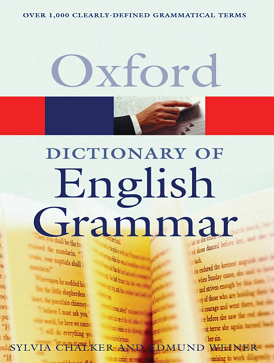
e-BOOK
The Oxford Dictionary of English Grammar
Grammar, etymologically speaking, is related to glamour. Though few people might claim that grammar is glamorous in the modern sense, there is considerable interest in English grammar today and no shortage of grammar books, ranging from small basic books aimed at
children or elementary-level foreign learners, through more advanced manuals to large scholarly works. The trouble is – they may be about the same language, but they do not always speak the same language. The very range of the grammar books on offer presents problems. There are many ways of describing grammar, and a wealth of terminology. Some of it strikes the layman as jargon (disjunct, matrix, pro-form, stative); other words appear ordinary enough but conceal
specialized meanings (assimilation, comment, focus, specific). Worse, the same terms, old or new – comparison, formal, pronoun, reported speech, root, stress – are used by different grammarians with different meanings.
Such difficulties are not entirely avoidable. Any subject of study needs specialist words. Different grammarians are entitled to analyse language in different ways, and fresh viewpoints may call for new terms. But while grammarians sometimes explain what they mean by a new or unusual term, it is rarer for them to point out that they are using an existing term in a different way. This is a cause of real confusion. Another problem is that new terms may in the end turnout simply to be alternatives for an old concept – a synonym in fact (e.g. progressive, continuous).
We have tried in this dictionary to indicate the range and variety of meanings that may lie behind a single term. The main emphasis is on the terminology of current mainstream grammar, but we have also included a considerable number of entries on the related areas of speech and meaning – more grandly known as phonetics and semantics. Users will also find some terms from generative grammar, which has greatly influenced mainstream grammar in recent years – but some of the more theoretical terminology of linguistics and semantics is excluded. We have also on the whole excluded outdated grammatical terminology, apart from a few traditional terms which may be familiar to the general reader.
Ketersediaan
| 144 | 425 | Website | Tersedia |
Informasi Detail
- Judul Seri
-
-
- No. Panggil
-
425
- Penerbit
- United K ingdom : Oxford University Press., 2018
- Deskripsi Fisik
-
882 halaman
- Bahasa
-
Inggris
- ISBN/ISSN
-
978-0-19-280087-9
- Klasifikasi
-
425
- Tipe Isi
-
text
- Tipe Media
-
computer
- Tipe Pembawa
-
online resource
- Edisi
-
-
- Subjek
- Info Detail Spesifik
-
-
- Pernyataan Tanggungjawab
-
Sylvia Chalker
Versi lain/terkait
Tidak tersedia versi lain
Lampiran Berkas
Komentar
Anda harus login sebelum memberikan komentar
 Karya Umum
Karya Umum  Filsafat
Filsafat  Agama
Agama  Ilmu-ilmu Sosial
Ilmu-ilmu Sosial  Bahasa
Bahasa  Ilmu-ilmu Murni
Ilmu-ilmu Murni  Ilmu-ilmu Terapan
Ilmu-ilmu Terapan  Kesenian, Hiburan, dan Olahraga
Kesenian, Hiburan, dan Olahraga  Kesusastraan
Kesusastraan  Geografi dan Sejarah
Geografi dan Sejarah